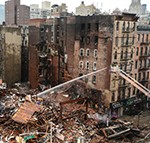Edward Wydra, who owns several rent-stabilized buildings in New York City, is facing a $28,000 bill — and a potentially bigger problem after he pays it.
Under Local Law 157, like most landlords in New York City, Wydra has until May 1, 2025, to install natural gas detectors in every unit with a gas appliance. But beyond that expense, Wydra is concerned about the consequences of alarms, including unrecoverable expenses and prolonged gas shut-offs.
Local Law 157, passed in 2016, requires detectors within 10 feet of gas appliances in all residential units. The regulation, which has been delayed for years, was enacted following a series of deadly gas-related incidents including a major explosion in the Bronx nearly a decade ago.
The Department of Buildings says even inexpensive detectors can save lives by providing early warnings of gas leaks, as similar devices do for smoke and carbon monoxide.
The cost of compliance, on paper, seems minimal. Apartments might have one or two gas appliances — a stove and a dryer — meaning one $20 detector could suffice in many units.
However, Lee Hoffman, president of Runwise, a smart controls platform for heating and water systems warns that these sensitive devices could trigger a “gas apocalypse,” with reported leaks leading to gas shut-offs and costly repairs. Studies have found that gas stoves leak even when they are off.
At rent-stabilized buildings like Wydra’s, landlords can’t easily pass the costs onto tenants. To do so, they must file for a major capital improvement, which can take two years to be approved by the New York State Division of Homes and Community Renewal. Meanwhile, the owners’ costs remain unrecovered, putting pressure on their buildings’ cash flow.
“A $20 gas flex pipe could end up costing $4,000,” Wydra said, “because you need a licensed plumber to perform a gas test with the Department of Buildings before turning the gas back on.”
Gas shutoffs can also last a while. In Washington Heights, tenants went more than a year without gas following a minor leak. As the May 2025 deadline for installing detectors approaches, landlords are bracing for compliance costs and unintended consequences.
If gas service is shut off following a reported leak, owners face an uphill battle to restore it. Repairs can include extensive re-plumbing, costing hundreds of thousands of dollars.
The costs do not stop there. Landlords may incur costs for breaking walls, replacing tiles, and providing rent abatements during gas outages, which can drag on for months or even years.
“We will never recoup the full costs,” Wydra said.
Read more



